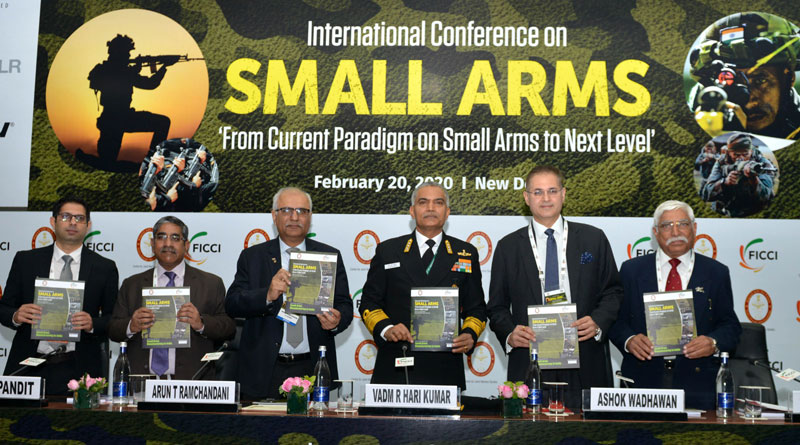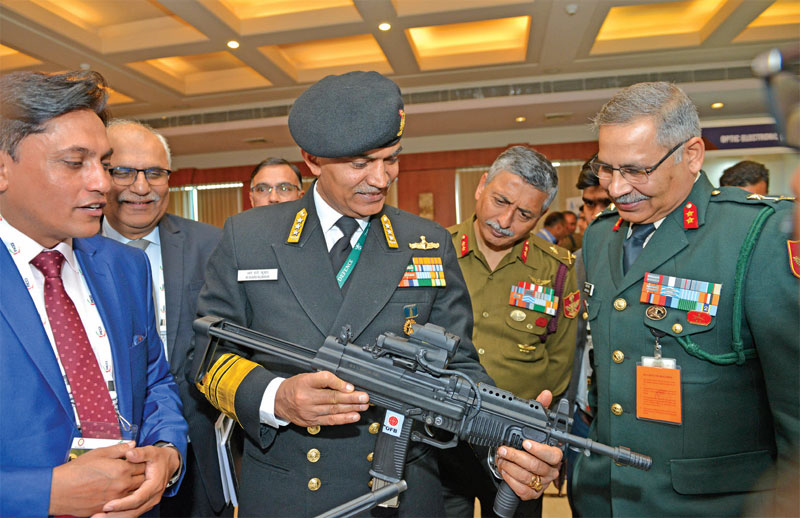Self-reliance was the underlying message at a conference on small arms held in New Delhi
Smruti D
Delivering a special address at the International Conference on Small Arms, Chief of Integrated Defence Staff to the Chairman Chiefs of Staff Committee (CISC) VAdm. R. Hari Kumar said that to meet urgent requirements, self-reliance in the production of small arms was fundamentally necessary for the nation in the long run.

Emphasising upon strategic autonomy, he said, “It is essential that the basic weapons are manufactured here. So, for true strategic autonomy and self-reliance, we, the users, the academia, Defence Research and Development Organisation (DRDO), public and private sectors must act with synergy and resolve to develop state-of-the art technology.” He added how defence personnel were interested in developing the product in the country with the production facilities, supply and support as key to manufacturing.
According to him, the current security environment of India required military forces to be prepared to handle a wide spectrum of challenges, both, conventional, non-conventional and asymmetric. To effectively meet these, personnel need to be equipped with state-of-the-art small arms. This would considerably increase combat efficiency, confidence and motivation of the troops, he said.
Saying that India’s key drawback has been “our inability to indigenously design, develop and manufacture contemporary equipment, like small arms to equip our forces”, he said that he was glad now as there were indigenous companies producing and exporting world class weapons.
The conference ‘From Current Paradigm on Small Arms to Next Level’ was jointly organised by the Federation of Indian Chambers of Commerce and Industry (FICCI) and Centre for Joint Warfare Studies (CENJOWS). A total of five panel discussions took place on various issues regarding the manufacturing of small arms. The discussions were centred-around indigenisation of defence manufacturing and how the lethality, mobility and survivability of the soldiers should be kept up to ensure ‘Mission Reliability’.
Certain panel members spoke about bringing in new-age technology and weapon systems. Some members emphasised the need and development of Artificial Intelligence (AI), Training Aids and Simulators in the forces. In attendance were both, private and state-owned defence companies.
A Knowledge Report on Small Arms Manufacturing in India and CENJOWS journal, Synergy on Inter-Services Operability were released in the inaugural session. Originally scheduled to be released by minister of state for defence Shripad Yesso Naik, who could not make it to the conference, the publications were released by the inaugural panel. The panel comprised VAdm. Hari Kumar, co chairman, FICCI defence and aerospace committee and EVP, Guns Missiles &Armoured Systems (GMA) BU, L&T Defence Arun T. Ramchandani, director, CENJOWS Lt Gen. Vinod Bhatia (retd) and member, FICCI defence and aerospace committee as well as chairman, PLR Systems Private Ltd, Ashok Wadhawan.
Speaking on how the nature of warfare is changing around the world, Maj Gen. A.K. Channan, PVSM, SM, ADG PP (B), Indian Army, said that the nature of warfare had been evolving and that India needed to start thinking in terms of producing modern weapon systems.
Unlike today, he said, that earlier everything was hardware centric and evolution of weapon systems was incremental in nature. Then, “technology started coming into the battlefield in a big way. It became cheap. So, we started calling it ‘revolutionary warfare’. Now there was a transaction between technology and doctrine. At some places technology drives the doctrine and in some places, doctrine still continues to drive the technology.”
Stressing on the fact that warfare and warfare practices had changed, he said that everything was happening in a disruptive manner and that areas of influence were becoming boundless. “We are going to engage in battlefields which are in the cyber physical domain,” he stressed.
He added that the nature of small arms has essentially remained the same and had evolved linearly in the last 200 years. But with warfare and warfare practices changing, we were living in a world where things were happening in a disruptive manner, areas of influence were becoming boundless, warfare was 360 degrees, 24/7 with diminishing borders.
Small arms have to become “much more smarter, much more loaded and much more relevant to today’s context of warfare.”
Modern warfare practices today are very different than those of the olden days. We are living under a threat of drones coming in from any direction and hitting us, for which we have to be prepared with drone guns and RF guns. We need to take measures to “neutralise,” he added.

Robots are being introduced in warfare, he said, and we need guns to counter them. If we invest in technology that was already 15 years old, we will have to be stuck with it for next 15-20 years.
The world had started looking for optimised mid-range calibre between 6.5-6.8. A few countries like the US, UK, Germany and France had started working on Next Generation Squad Weapon.
Speaking for the soldier on the ground, Maj Gen. Channan said that these countries are looking for something that “doesn’t necessarily fire heavier, faster but is lighter and more accurate.” That’s why, he said, we needed guns of optimal calibre which would actually lower the load of the soldier.
He added that the countries working on future weapon systems were giving serious thought to multirole capability weapon systems so that the soldiers don’t have to carry multiple things.
“It has to be smart so that it eliminates personal biases. Today, much of the targeting that happens is because of individual deficiencies. But if the weapon is smart enough, within five rounds it can pick up an individual bias and correct it on its own or give the right indicators.”
Summarising, he said, “Ergonomics, ease of employment, adaptability for quick response in situations are actually issues that we will need to examine.”
Also present at the event was joint secretary, department of defence production, ministry of defence, Sanjay Jaju, who speaking at the end, urged Indian companies to reach out to the ministry in case of any problems they may be facing in terms of operations, permissions and testing.

